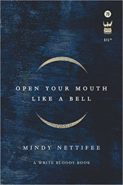
Review: Open Your Mouth Like a Bell by Mindy Nettifee
Reviewed by Ronnie K. Stephens

Open Your Mouth Like a Bell
Poems by Mindy Nettifee
Write Bloody Publishing, April 2018
$14.08, 100 pp.
ISBN-13: 978-1938912832
Open Your Mouth Like a Bell is the second full-length collection by Mindy Nettifee, author of Glitter in the Blood: A Poet’s Manifesto for Better, Braver Writing and editor of Courage: Daring Poems for Gutsy Girls. Nettifee proliferates her newest collection with narratives that highlight strength, vulnerability, and the importance of the female experience. Throughout Open Your Mouth Like a Bell, readers are reminded that softness is not inherently dichotomous with courage or resilience.
Nettifee is a vocal feminist who has dedicated much of her creative work to telling hard truths, and to lifting up women at every turn. In “Chopin,” readers experience that celebration of unapologetic womanhood. The speaker tells Kate Chopin:
I can’t help but wish
I had been there the moment you threw the ring
into the black, the exact second you decided to lose it,
on purpose, to be the one who got to choose
which madness you would purchase.
It is a thing of beauty, startling fucking beauty,
to see a woman belong to herself utterly.
Nettifee then turns the lens inward, confessing:
…I know what it takes
to throw the ring, and not your own body,
when all you want is surrender
to one last baptism;
to be done.
This juxtaposition of fierce assertion and honest admission carries through the collection, illustrating Nettifee’s uncanny ability to draw the reader in with poignant moments of honesty.
No stranger to art as politics, Nettifee crafts poems which are strikingly patient in their language, yet urgent and direct. In “Portable Gods,” the speaker recounts a story told by Alex White Plume, a Lakota Sioux elder, about how a representative from the Vatican dismissed the Sioux people because of their nature-based faith. The speaker reflects:
Alex White Plume has been fighting his whole life
to be heard when he uses the word sovereign.
I was born female, so I think I know how he feels,
but I will also never know how he feels.
These lines speak to the to the layers of social commentary woven into the book that investigate levels of privilege along gender and racial lines. Speakers throughout the collection critique various elements of societal oppression and inequality. The speaker in “Election Eve” laments the 2016 election by linking experiences with misogyny in the business world back to dressing in drag at ten years old, and even considers the inherent power of language in “On Being Raised Christian and Taught English.” The poem begins:
When they told me I had a “soul”
I thought they meant I was some kind of bottle;
that something liquid and the color of burning rainbows
had been poured in to me when I was born.
As the speaker continues, words continue to challenge her understanding of self, first as “soul” becomes “ghost,” a “white me-shaped air, / the thick wife of breath…” before learning that “ghosts [aren’t] real, just ‘figments.’” At seven, the speaker visits a beehive where she connects the cells of a honeycomb to her understanding of the body. The speaker then explains that “Questions filled [her] like helium, so many questions.” In the final stanza, some of those questions come to the surface:
Why did they want me to believe
I was NOT my body in the first place?
If they knew all the things I didn’t know yet
Why did they look the way they looked
When I asked my questions out loud?
Why did they look so worried?
Throughout the poem, Nettifee bridges the natural curiosity of childhood with self-reflection to contextualize how subtly young girls are taught that they are separate from their bodies, and that their bodies do not belong to them. Here, Nettifee has illustrated that the problem of objectification is not inherently linked to beauty; rather, the culture of objectification injects itself into every aspect of society, even language, working to remove the very idea of body autonomy even in childhood.
Though sociopolitical commentary arises often, Open Your Mouth Like a Bell also includes remarkably tender, personal pieces. One of the most memorable is “An Ordinary Story by the Ocean,” which opens with the abrupt revelation: “I used to love you, and then I didn’t.” What follows is a heartbreakingly honest revelation about the end of a relationship. The speaker admits that “It’s hard to say when a beginning is over.” She later confesses:
I can say the words, I miss you or I’m sorry,
but they come out like pouring sand.
I didn’t know, I’m always defending,
I didn’t know I was capable.
I didn’t know I was made of so much desert.
Ultimately, Open Your Mouth Like a Bell, refreshing in its language, is a collection with which readers will easily connect. The collection also situates itself alongside recent releases like The Breakbeat Poets Vol. 2: Black Girl Magic and Women of Resistance: Poems for a New Feminism, each a poignant commentary on the place of women in contemporary society. As the poems in this collection show, Nettifee is well-versed in navigating the hard conversations of everyday life with equal parts grace and fervor, using art as a catalyst for personal and societal growth.
Ronnie K. Stephens is a full-time educator and father of five, with a strong interest in poetry, fiction, and activism. He recently completed an MA in Creative Writing and an MFA in Fiction at Wilkes University. During his time at Wilkes, he was awarded two scholarships and won the Etruscan Press Prize. Stephens has published two full-length poetry collections, Universe in the Key of Matryoshka and They Rewrote Themselves Legendary, with Timber Mouse Publishing out of Austin. His first novel, The Kaleidoscope Sisters, is forthcoming in 2018.

Leave a Reply